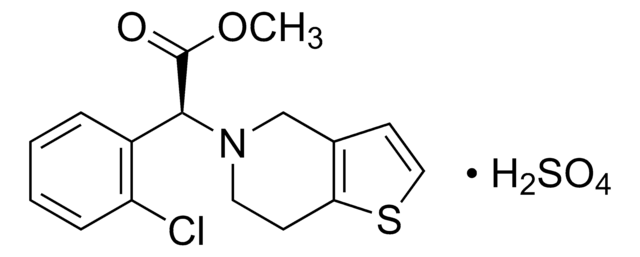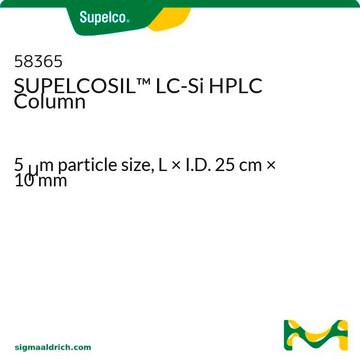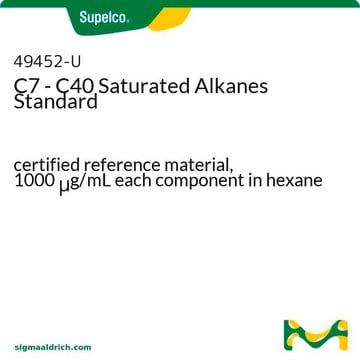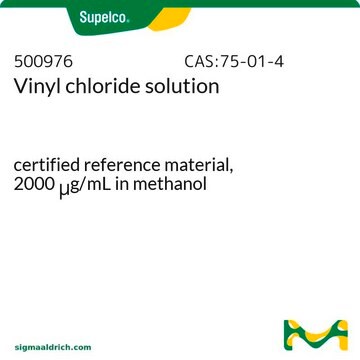P2600000
Poly(vinyl chloride)
European Pharmacopoeia (EP) Reference Standard
Synonym(s):
PVC
Sign Into View Organizational & Contract Pricing
All Photos(1)
About This Item
Linear Formula:
(CH2CHCl)n
CAS Number:
MDL number:
UNSPSC Code:
41116107
NACRES:
NA.24
Recommended Products
grade
pharmaceutical primary standard
manufacturer/tradename
EDQM
density
1.4 g/mL at 25 °C (lit.)
application(s)
pharmaceutical (small molecule)
format
neat
SMILES string
ClC=C
InChI
1S/C2H3Cl/c1-2-3/h2H,1H2
InChI key
BZHJMEDXRYGGRV-UHFFFAOYSA-N
Looking for similar products? Visit Product Comparison Guide
General description
This product is provided as delivered and specified by the issuing Pharmacopoeia. All information provided in support of this product, including SDS and any product information leaflets have been developed and issued under the Authority of the Issuing Pharmacopoeia. For further information and support please go to the website of the issuing Pharmacopoeia.
Application
Poly(vinyl chloride) EP Reference standard, intended for use in laboratory tests only as specifically prescribed in the European Pharmacopoeia.
Packaging
The product is delivered as supplied by the issuing Pharmacopoeia. For the current unit quantity, please visit the EDQM reference substance catalogue.
Other Notes
Sales restrictions may apply.
Storage Class Code
11 - Combustible Solids
WGK
WGK 3
Flash Point(F)
Not applicable
Flash Point(C)
Not applicable
Choose from one of the most recent versions:
Certificates of Analysis (COA)
Lot/Batch Number
Sorry, we don't have COAs for this product available online at this time.
If you need assistance, please contact Customer Support.
Already Own This Product?
Find documentation for the products that you have recently purchased in the Document Library.
Customers Also Viewed
Christopher B Stipe et al.
Applied spectroscopy, 66(11), 1286-1293 (2012-11-14)
Airborne silica dust (quartz) is common in coal mines and represents a respiratory hazard that can lead to silicosis, a potentially fatal lung disease. With an eye toward developing a portable monitoring device for rapid analysis of silica dust, laser-induced
Hong Wang et al.
Environmental science & technology, 46(21), 11566-11574 (2012-10-11)
Opportunistic pathogens represent a unique challenge because they establish and grow within drinking water systems, yet the factors stimulating their proliferation are largely unknown. The purpose of this study was to examine the influence of pipe materials, disinfectant type, and
T D Ambrisko et al.
British journal of anaesthesia, 110(2), 305-310 (2012-11-21)
In a previous study, the authors found a large bias (50%) for lithium (LiDCO) compared with thermodilution cardiac output measurement methods in ponies receiving i.v. infusions of xylazine, ketamine, and midazolam. This prompted the authors to examine the effect of
Gianluigi Li Bassi et al.
Critical care medicine, 41(2), 518-526 (2012-12-25)
To assess the structural characteristics involved in the design of high-volume low-pressure endotracheal tube cuffs that are associated with fluid sealing effectiveness and to determine the extent of transmitted tracheal pressures upon cuff inflation. In vitro study. Pneumology laboratories. Eight
Olivier Firmesse et al.
International journal of food microbiology, 159(3), 179-185 (2012-10-31)
The aim of this study was to determine how quickly the surface of a refrigerated supermarket serve over counter becomes loaded with bacteria. New material made of polyvinyl chloride or stainless steel was placed on the surface on which foodstuffs
Our team of scientists has experience in all areas of research including Life Science, Material Science, Chemical Synthesis, Chromatography, Analytical and many others.
Contact Technical Service







